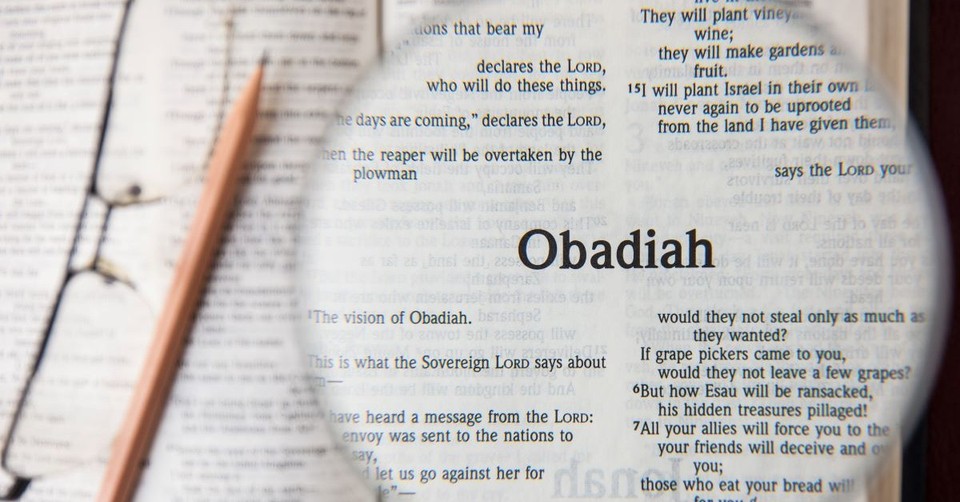3 Key Lessons We Can Learn from the Small Book of Obadiah

Like many of the minor prophets, Obadiah gets overshadowed by the more popular works of Isaiah, Jeremiah, and Ezekiel. This is partly due to a lack of knowledge about Obadiah himself. It is certain that this Obadiah is not the same person who was a contemporary of Elijah, as seen in 1 Kings 18. Scholarship dates the book of Obadiah to shortly after the destruction of Jerusalem, well past Elijah’s day. Beyond this, nothing is known about this enigmatic prophet.
Adding to Obadiah’s obscurity is the fact that it is the shortest book of the Old Testament. Tucked between Amos and Jonah, it is easily missed. Yet this small, compact, prophesy deserves to be known. Obadiah’s vision speaks profoundly to many issues facing Christian people today. His words are provocatively contemporary. Here are 3 important lessons Obadiah teaches.
Obadiah Teaches the Folly of Pride
Obadiah speaks against the Edomites, who were continually at odds with Israel. What began as a sibling rivalry between Jacob and Esau continues between the nations they establish. During their journey to the Promised Land, for example, the Edomites refused to allow Israel passage through their territory. Edom even threatened to attack Israel lest they get too close to their border (Numbers 20:20). Israel is made to take an alternative route which immediately finds them attacked by the Canaanite king of Arad. The hostility between these two nations grows from then on. Saul, David, and Solomon, all lead military campaigns against the Edomites.
Obadiah prophesies against Edom after the fall of Jerusalem in 587 BC. In response to Israel’s destruction, Edom adopts an attitude of self-righteousness. Israel had fallen and Edom remained. As Edom saw it, this meant that God favored Edom over Israel Thus, they puff themselves up with pride, believing themselves to be the favored of God. Obadiah rebukes Edom for this spiritual pride, crying, “Your proud heart has deceived you, you that live in the clefts of the rock, whose dwelling is in the heights…from there I will bring you down, says the Lord” (3-4). Obadiah declares the certainty of divine judgment.
Edom’s pride makes them believe that they are without reproach, without fault. They see themselves as vindicated before God. Because of this pride, they are unwilling to notice how, they too, have stepped away from God’s divine plan. Obadiah’s prophecy calls Edom to recognize their own spiritual need. Obadiah cries out “As you have done, it will be done to you; your deeds will return upon your own head” (1:15). God cannot deny God’s own holiness. In choosing the way of pride, Edom will eventually experience the consequences of that decision.
Pride masks sin. Pride makes us unable to see the way of the Lord. We turn our gaze inward, self-assured and self-focused. When we live this way, we live as if the world revolves around us, to serve our wishes and whims. This displaces the Lord as our source of life and satisfaction. It is idolatry of the self. Pride will always produce dire consequences for us. As Proverbs states, “Pride goes before destruction, a haughty spirit before a fall” (Proverbs 16:18). In the end, pride destroys our spiritual lives.
This is particularly relevant given the propensity to “cancel” those we disagree with. Cancel culture is rooted in pride, for it is based on the arrogant assumption that our way is the divine way. It is an exaltation of the self.
At times, Christians can be on the receiving end of cancel culture. We may be ridiculed or rebuked for our faith. Obadiah’s words offer us hope. When we feel the hurtful barbs of others, we need not retaliate against them, nor fight harm for harm. Obadiah reminds us that God is aware when others mock or rebuke us for our faith. In fact, Jesus comments that this is to be expected. Jesus is quite forthright, “Blessed are you when people insult you, persecute you, and falsely say all kinds of evil against you because of me” (Matthew 5:11). Rather than canceling those who cancel us, we are called to embody the way of love, humility, and grace. Obadiah reminds us that God’s righteous ways, along with God’s righteous people, will be vindicated in God’s own time.

Photo Credit: Unsplash/Aaron Burden
Obadiah Teaches the Folly of Boasting
Edom was not just prideful at their escape from the exile, they gloated over Israel’s demise. They rejoiced as Jerusalem was ransacked by foreign armies; they cheered as the Temple was destroyed; they applauded while people were taken away to be enslaved in Babylon. Obadiah scolds Edom for taking gleeful pleasure at Israel’s downfall. Verse 12 reads; “You should not have gloated over your brother on the day of his misfortune; you should not have rejoiced over the people of Judah on the day of their ruin, you should not have boasted on the day of distress.” Obadiah even states that Edom stood by the crossroads to “hand over their survivors in the day of trouble” (1:14). Edom didn’t just sit by and watch the fall of Jerusalem; they gleefully took part in the plunder! Instead of ministry, they offered mockery, instead of comfort they voiced contempt.
It can be easy to rationalize our gloating. It is a good bet that Edom justified their boasting under the rhetoric of justice. After all, Edom had a long history of conflict with Israel. Battles were fought, insults were hurled. Both sides of the conflict looked upon the other with disdain and dislike. Thus, when Israel was conquered Edom probably felt that Israel, finally, had “gotten what they deserved.” Such prideful boasting can be easy to adopt, personally and nationally.
Have you ever rejoiced that someone “got their comeuppance”? Have you ever declared someone’s misfortune as the outworking of “what goes around comes around”? Such statements may seem innocent enough. They may even seem accurate. Yet what they amount to is a gleeful celebration of disadvantage and hurt. Gloating over another’s misery suggests that God delights in tragedy.
When we find ourselves in a time of tribulation, it can be difficult to offer grace amid such taunts. Obadiah is clear that boasting in another’s adversity is contrary to the way of God. We are called to “bless and not curse” (Romans 12:14). As Christ endured the shame of the cross, so too are we called to fix our eyes upon the joy set before us (Hebrews 12:2). God promises to frustrate the strong and make foolish the wise. Amid the gloating of others, we are called to embody a faithful hope; to boldly believe that, in the end, the redemptive love of the Lord will reign, and we will be healed.
Obadiah Teaches the Power of the Kingdom
God reigns: this is the promise of Scripture. Obadiah’s prophesy ends by declaring that God’s kingdom will not be thwarted. “The day of the Lord is near”, says Obadiah (1:15). God will visit God’s people and execute judgment over sin, death, and all the spiritual forces that corrupt and destroy God’s creation. The day of the Lord will be a day of salvation for all God’s people. The last phrase in Obadiah, the one that serves as the climax to the entire prophecy, is “the kingdom will be the Lord’s” (Obadiah 1:21). God will establish His own kingdom upon the earth, a kingdom wherein the hurting are healed, the lost are forgiven, and the displaced are brought home.
As people of Christ, we look at this prophesy through the lens of the New Testament. The incarnation of God in the person of Jesus is the fulfillment of this prophecy. The day of the Lord had come, and the kingdom of God has broken into this world. This was Jesus’ primary message. “The time has come, the kingdom of God has come near”, Jesus cried (Mark 1:8). Similarly, when people question his ministry, Jesus says that “If it is by the Spirit of God that I drive out demons, then the Kingdom of God has come upon you” (Matthew 12:28). Jesus inaugurated God’s kingdom upon the earth and invites us all to participate in it. Healing, grace, and love are open and available to us all.
How Can We Apply These Lessons to Our Lives?
As faithful people, it is easy to see Obadiah’s prophesy as issued against those whom we would consider our enemies. We read the words regarding the future destruction of Edom and see it as a warning against those who rebuke us for our faith or rejoice over our misfortune. There is an element of this, but we should not be too quick to exalt ourselves over others. After all, this is exactly what Edom did.
We are to live our lives differently. If we wish to live our lives encased in God’s purposes for us, then we need to put down prideful arrogance and stubborn ways and act in Christlike humility. We are to boldly rebuke all temptations of pride and selfish boasting. All celebration at the expense of another’s misfortune is wrong. To do so is to place ourselves over the other. It is rooted in selfishness and egoism and does not display the humble heart that God’s people are to display. The Apostle Paul wrote that “love does not boast.” (1 Corinthians 13:4). The love that we are to have towards others is grounded in our call to uphold one another in grace, mercy, and forgiveness. We cannot forgive another if we boast over their hurts. We cannot extend grace when we are too busy feeling pleasure over what has befallen them.
As the body of Christ, our eyes should be steadfastly on God’s kingdom. Jesus taught us to pray for God’s kingdom to come “on earth as it is in heaven.” The primary location wherein God’s kingdom is revealed is in the context of our own lives. To live in the kingdom is to keep our eyes upon Jesus and cultivate a Godly response toward others. When cursed, we bless. When insulted, we respond with peace. In this way we live in the kingdom, we participate in it, and better yet, we invite others to experience it. This is the lesson of Obadiah. This is the way of Jesus.
Related Resource: Check out our FREE Bible Study podcast, How to Study the Bible! Available at LifeAudio.com. Listen to the first episode here by clicking the play button below:
Photo Credit: ©GettyImages/aradaphotography

Originally published August 23, 2021.





